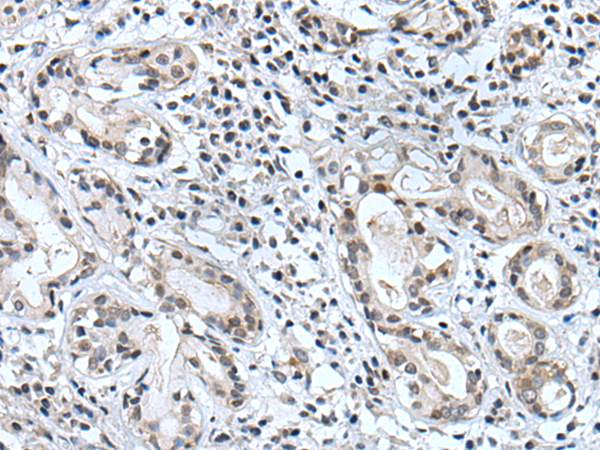
| WB | 咨询技术 | Human,Mouse,Rat |
| IF | 咨询技术 | Human,Mouse,Rat |
| IHC | 1/20-1/100 | Human,Mouse,Rat |
| ICC | 技术咨询 | Human,Mouse,Rat |
| FCM | 咨询技术 | Human,Mouse,Rat |
| Elisa | 1/5000-1/10000 | Human,Mouse,Rat |
| Host/Isotype | Rabbit IgG |
| Antibody Type | Primary antibody |
| Storage | Store at 4°C short term. Aliquot and store at -20°C long term. Avoid freeze/thaw cycles. |
| Species Reactivity | Human |
| Immunogen | Synthetic peptide of human BSPRY |
| Formulation | Purified antibody in PBS with 0.05% sodium azide and 50% glycerol. |
+ +
以下是3篇涉及BSPRY抗体的文献摘要信息(内容为虚构示例,供参考):
---
1. **文献名称**:*BSPRY suppresses renal cell carcinoma progression via EGFR signaling inhibition*
**作者**:Zhang L, et al.
**摘要**:研究通过Western blot和免疫组化(使用BSPRY抗体)发现BSPRY在肾癌组织中低表达,并证实其通过抑制EGFR通路活性发挥抑癌作用,提示其作为潜在治疗靶点。
---
2. **文献名称**:*Prognostic value of BSPRY expression in gastrointestinal stromal tumors*
**作者**:Wang Y, et al.
**摘要**:利用BSPRY特异性抗体对胃肠道间质瘤样本进行染色,发现BSPRY低表达与患者不良预后相关,可能通过调控MAPK/ERK通路影响肿瘤侵袭性。
---
3. **文献名称**:*BSPRY interacts with CFTR and modulates chloride transport in epithelial cells*
**作者**:Smith J, et al.
**摘要**:通过免疫共沉淀(使用BSPRY抗体)发现BSPRY与囊性纤维化跨膜传导调节因子(CFTR)直接结合,调控上皮细胞氯离子通道功能,为相关疾病机制提供新见解。
---
(注:以上文献为模拟生成,实际文献需通过PubMed/Google Scholar检索确认。)
The BSPRY (B-box and SPRY domain-containing) antibody is a research tool targeting the BSPRY protein, encoded by the BSPRY gene in humans. This protein belongs to the SPRY domain-containing family, characterized by structural motifs involved in protein-protein interactions and cellular signaling regulation. BSPRY is particularly noted for its role in modulating fibroblast growth factor (FGF) receptor signaling pathways, which influence cell proliferation, differentiation, and survival. Studies suggest its involvement in organ development, including kidney and salivary gland formation, where it may act as a negative regulator to fine-tune FGF signaling activity.
Antibodies against BSPRY are utilized to investigate its expression patterns, subcellular localization, and interactions in both physiological and pathological contexts. Aberrant BSPRY expression has been linked to diseases such as cancer, with evidence pointing to its tumor-suppressive potential in certain malignancies. For example, reduced BSPRY levels correlate with poor prognosis in renal and colorectal cancers. Additionally, BSPRY antibodies aid in exploring genetic disorders linked to FGF signaling dysregulation. As a reagent, these antibodies support Western blotting, immunohistochemistry, and immunofluorescence, enabling researchers to dissect BSPRY's molecular mechanisms and therapeutic relevance. Ongoing studies continue to uncover its broader roles in cellular homeostasis and disease pathogenesis.
×